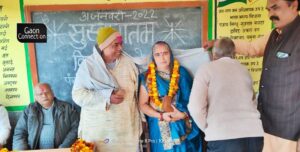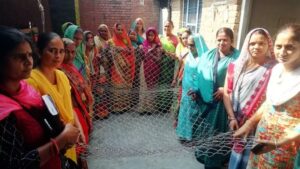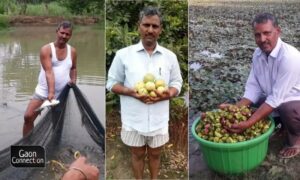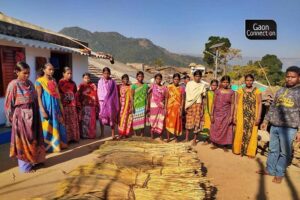Satna, Madhya Pradesh
In his address to the nation through his monthly Mann Ki Baat programme, Prime Minister Narendra Modi talked about a farmer in Madhya Pradesh whose love for indigenous vegetables has led him to preserve their seeds in what he calls is his ‘life’s purpose’.
The 64-year-old farmer is on a mission to grow and conserve the seeds of indigenous vegetables as well as medicinal herbs.
Bottle gourds, in different shapes and sizes, are on display on one wall. Look around and there are other legumes of vegetables arranged neatly, in what is a museum of seeds. “I am in love with indigenous vegetables and herbs, they mean everything to me,” Ram Lotan Kushwaha, a farmer from village Atarvediya in Madhya Pradesh told Gaon Connection.
Ram Lotan has as many as 12 different varieties of lauki (bottle gourd) growing on his acre of land, besides brinjal and other vegetables. He also grows more than 250 medicinal plants. And their seeds are being collected and conserved in the museum he has set up.
Each of his lauki has a name depending on its shape, he laughed, pointing out to them. “There is an ajgar lauki, that resembles a python and a tanpura lauki shaped like the musical instrument, among others,” Ram Lotan said. Some of the vegetables are consumed and others are kept aside for their seeds or to be used for medicinal purposes.
He rattled off a list of herbs and greens he cultivated. These included fennel, wild spinach, native coriander, chillies, cucumbers, and many more.
A rare quest
Ram Lotan once journeyed all the way to the foothills of the Himalayas to look for the Brahmi root. He has travelled to the jungles of Amarkantak in Madhya Pradesh where the Satupura and the Vindhya mountain ranges meet, in search of rare plants.
Also Read: A library for rice with grains from the past
“Sceptics said that Himalayan flora would not grow well here, but they are blooming and growing just as they do there,” Ram Lotan said. There are things growing on his farm that have history and lore attached to them. Such as the sui dhaaga (needle and thread) plant.
“In the days of rajas and swordfight, sword wounds were treated with the sui dhaaga,” Ram Lotan said. The plant was plucked, ground along with milk into a paste and applied to the wound and the healing would begin, he added.
Also Read: A Haywire Harvest: For the paddy farmers of Tamil Nadu, this year’s Pongal is going to be less sweet
Ram Lotan is very proud of the white palaash (Rare White Beuta Monosperma) that he grows. It is a rare plant and he is doing all he can to propagate it. “People from far and near come here to take the sapling or just see the flower, to my farm,” he said.
Nurturing a legacy
Ram Lotan’s father, Kathahura Kushwaha had great interest in ayurveda and that is what led his son Lotan into it, he said. “I was not particularly interested in studies but was drawn to my father’s garden filled with medicinal herbs,” he recalled.
His father passed away when he was about nine years old, said Ram Lotan, but the love for plants stayed on. Today, two of Lotan’s three sons are as interested as he is and taking his legacy forward. “My seven-year-old granddaughter loves them too and can easily recognise the different herbs and plants. She often accompanies me when I go out foraging for them,” he said with pride.
Ram Lotan said a lot of his knowledge about the medicinal plants he grew came from forest dwellers. “They have great knowledge about the things growing in the jungles and I often visit them. They come to me too,” he said.
Also Read: My aim is to preserve our tradition for the next generation’
“I am in touch with the tribal communities who live in close proximity to Nature. I regularly visit them where they live in or near the forests in the districts of Balaghat, Umria, Shahdol, Nimad and Bhind,” Ram Lotan said, adding that he often visited tribal communities in Dantewada and Bastar, too. His immense knowledge about the medicinal plants have earned him the title of Vaidya ji or doctor.
Ram Lotan was further influenced by Padmashri winner Babulal Dahiya, farmer, environmentalist, seed conservationist from the nearby village of Pithorabad about two kilometres from Atarvediya.
“Babulal Dahiya got me involved in researching the biodiversity in the state,” he said. In 2018, Ram Lotan’s laukis found a place in the calendar brought out by the biodiversity board. In 2012 the Madhya Pradesh State Biodiversity Board gave him a grant of Rs 50,000 to continue with his good work.
Ram Lotan is happy on his mission. All he wants is a little help from the government. “If I could get support to fence the land, to keep away wild animals that destroy the plants, and provide for a well, I can do a lot more to preserve, conserve and propagate these indigenous flora that is such a priceless legacy,” he said.
Read the story in Hindi



















